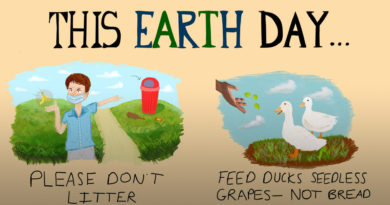Saving The Planet Will Save Humanity
“Save the planet.” Do these words sound familiar? Are you the person who thinks we are “saving the planet” when we protect the environment?
If you answered yes to the last question, you are not alone. Until recently, I was one of those who blindly used the phrase “save the planet” when referring to the survival of the human race.
It was not until I spoke to Carola Pedreschi, a psychology professor at North Campus and council member of Miami Dade College’s Earth Ethics Institute, that I actually understood we are indeed saving ourselves when taking care of the environment.
When we recycle, we are protecting humanity. When we reduce our energy consumption, we are protecting humanity. When we limit our meat and dairy intake, we are protecting humanity. Most importantly, whenever we make any small change in our daily habits to live greener, we are not saving the planet—we are saving ourselves. Professor Pedreschi clarified this concept, explaining that the planet existed long before humans appeared and will continue existing even if we don’t survive.
This being said, we are the ones responsible for our own survival. By making seemingly insignificant choices, such as walking or carpooling instead of using one or more cars, we can prolong our existence on this planet.
Anyone, regardless of age or any socioeconomic factor, can take action to build a more sustainable environment. Pedreschi encourages sustainability in her courses that contain a Global Sustainability and Earth Literacy Studies (GSELS) component.
Her students enrolled in these classes have completed several projects to change energy consumption behaviors in their households. They gathered some simple suggestions on saving energy based on their experiences and an online Florida Power & Light survey.
Unplugging appliances that are rarely used, turning off lights in unused rooms, taking advantage of natural lighting during daytime, using cold water when doing laundry and turning off the water heater when the house is empty, are among the changes that allowed these students to save both energy and money. By incorporating these small tweaks into our lifestyles, we can lower our energy bills and reduce carbon dioxide emissions, one of the biggest contributors to global warming and climate change.
There is an endless list of changes we can implement to make the earth more habitable. The college offers multiple sustainability opportunities not only in the classroom, but also through several clubs and organizations. By taking a GSELS course or joining the Youth for Environmental Sustainability Club, students can engage in environmental sustainability activities in the community.
Professor Hal Hollingsworth, who serves as the advisor of the Homestead Campus Green Team, encourages students to join this organization to participate in planting trees, cleaning beaches and growing produce in the campus’ organic garden.
Encouraging people to be environmentally conscious by teaching them to partake in these sustainability opportunities is the only way to ensure the earth will sustain the next generations of the human species.




